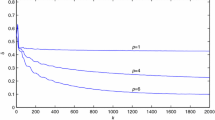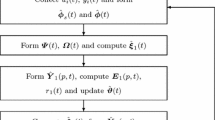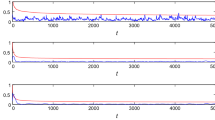Abstract
This paper studies the problem of the parameter estimation for control systems by means of the discrete observations under a sine excitation signal. In order to seize the dynamical characteristics of systems and obtain higher estimation accuracy, an objective function by using the dynamical data is constructed and optimized by the negative gradient search. For the purpose of obtaining fast convergence speed, a conjugate gradient algorithm is developed to estimate the system parameters, in which the search direction, i.e., the step-size can be determined in accordance with the variation of the objective function. Finally, a numerical example is provided to test the performance to the proposed method and the simulation results show that the presented algorithm based on the conjugate gradient is effective for process systems.
Access this chapter
Tax calculation will be finalised at checkout
Purchases are for personal use only
Similar content being viewed by others
References
Ding, F.: System Identification - New Theory and Methods. Science Press, Beijing (2013)
Ding, F.: System Identification - Performance Analysis for Identification Methods. Science Press, Beijing (2014)
Ding, F.: System Identification - Auxiliary Model Identification Idea and Methods. Science Press, Beijing (2017)
Ding, F.: System Identification - Iterative Search Principle and Identification Methods. Science Press, Beijing (2018)
Ding, F.: System Identification - Multi-Innovation Identification Theory and Methods. Science Press, Beijing (2016)
Ding, F.: Modern Control Theory. Tsinghua University Press, Beijing (2018)
Wang, Y.J., Ding, F.: Novel data filtering based parameter identification for multiple-input multiple-output systems using the auxiliary model. Automatica 71, 308–313 (2016)
Ding, F., Liu, G., Liu, X.P.: Partially coupled stochastic gradient identification methods for non-uniformly sampled systems. IEEE Trans. Autom. Control 55(8), 1976–1981 (2010)
Ding, J., Ding, F., Liu, X.P., Liu, G.: Hierarchical least squares identification for linear SISO systems with dual-rate sampled-data. IEEE Trans. Autom. Control 56(11), 2677–2683 (2011)
Ding, F.: Hierarchical multi-innovation stochastic gradient algorithm for Hammerstein nonlinear system modeling. Appl. Math. Model. 37(4), 1694–1704 (2013)
Ding, F.: Several multi-innovation identification methods. Digital Signal Process. 20(4), 1027–1039 (2020)
Xu, L., Ding, F., Zhu, Q.M.: Hierarchical Newton and least squares iterative estimation algorithm for dynamic systems by transfer functions based on the impulse responses. Int. J. Syst. Sci. 50(1), 141–151 (2019)
Ding, F.: Combined state and least squares parameter estimation algorithms for dynamic systems. Appl. Math. Model. 38(1), 403–412 (2014)
Ding, F.: State filtering and parameter estimation for state space systems with scarce measurements. Signal Process. 104, 369–380 (2014)
Ding, J., Chen, J.Z., Lin, J.X., Jiang, G.P.: Particle filtering-based recursive identification for controlled auto-regressive systems with quantised output. IET Control Theory Appl. 13(14), 2181–2187 (2019)
Chen, J., Shen, Q.Y., Ma, J.X., Liu, Y.J.: Stochastic average gradient algorithm for multirate FIR models with varying time delays using self-organizing maps. Int. J. Adap. Control Signal Process. 34(7), 955–970 (2020)
Acknowledgments
This work was supported by Qing Lan Project of Jiangsu Province, by the “333” Project of Jiangsu Province (No. BRA2018328), by Jiangsu Overseas Visiting Scholar Program for University Prominent Young and Middle-aged Teachers and Presidents.
Author information
Authors and Affiliations
Corresponding author
Editor information
Editors and Affiliations
Rights and permissions
Copyright information
© 2021 The Editor(s) (if applicable) and The Author(s), under exclusive license to Springer Nature Singapore Pte Ltd.
About this paper
Cite this paper
Xu, L. (2021). The Conjugate Gradient Algorithm for Control Systems with a Sine Excitation. In: Jia, Y., Zhang, W., Fu, Y. (eds) Proceedings of 2020 Chinese Intelligent Systems Conference. CISC 2020. Lecture Notes in Electrical Engineering, vol 706. Springer, Singapore. https://doi.org/10.1007/978-981-15-8458-9_26
Download citation
DOI: https://doi.org/10.1007/978-981-15-8458-9_26
Published:
Publisher Name: Springer, Singapore
Print ISBN: 978-981-15-8457-2
Online ISBN: 978-981-15-8458-9
eBook Packages: Intelligent Technologies and RoboticsIntelligent Technologies and Robotics (R0)




